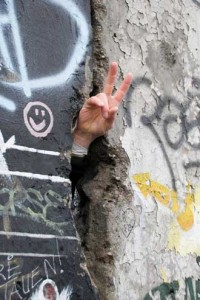“This is a song about AIDS and safe sex,” said the lead singer of Biest, one of East Germany’s leading heavy metal bands. “We’ve been doing it for a couple of years now, but with the opening of the wall we’re going to have to start worrying about these things.”
Five days after the Berlin Wall had been overrun, Biest were playing to a tiny and astonishingly well-behaved audience in one of East Berlin’s Youth Centres. The majority of their fans, I was told, had either gone to West Berlin or stayed home to watch a televised soccer match between the East German and Austrian teams. A dozen or so young boys positioned themselves in front of the stage, playing their air guitars, while the rest of the audience sat politely on metal chairs, nursing the juice-and-alcohol mixes which are the preferred drinks of East German youth. (Beer, as I discovered during my week-long visit to East Berlin, is associated with manual labour and corner taverns, and is rarely to be seen within discotheques or concert halls.)
Biest concluded their set with a song condemning the East German secret police. Backstage, members of the band were curious about heavy metal in Canada. Did I know Lee Aaron? Could they make it in Canada if they translated their lyrics into English? All had recently quit their day jobs, and in the excitement generated by political reform the band was looking to find an audience in the West. With only 16 million people, East Germany represented a limited market, and Biest had attained the upper reaches of domestic success.
Two nights earlier, I had been walking with my student guide along one of East Berlin’s main thoroughfares, looking for an open bar or café, when two teenagers directed us to a nearby church. The Gesthemane Church had become a principal centre of oppositional activity in East Berlin, and had been the site of well-publicized hunger strikes and clashes with police during the early weeks of autumn. Tonight, it was the venue for a marathon concert by four punk bands.
As I entered, it became apparent that the only light within the church was coming from two candles on the altar. Directly in front of these, and with her band and its sound system beside her, a woman belted out a song in French. Several hundred young East Germans, in black leather or military surplus dress, sat on the backs of the pews, smoking cigarettes and drinking from pocket flasks. Others milled around the entrance, reading the resolutions and announcements with which the opposition group New Forum had covered the walls.
The concert was billed as a celebration of Revolution. Allegedly, it was intended to commemorate the 200th anniversary of the French Revolution – hence the presence of a band from France – but its relevance to current events was obvious. The third group to play concluded by urging everyone to take to the streets, an invitation which met with limited success and some rolling of eyes. The last band, with a bitter irony that prompted applause, urged everyone to go out in search of empty soft drink bottles, which they might exchange for trinkets and pieces of chocolate in West Berlin.
Large numbers of young people to whom I spoke in the week following the opening of the wall expressed ambivalence about recent events. The euphoria that accompanied the lifting of travel restrictions was very often tinged with revulsion and a sense of humiliation as the spectacle of millions of fellow citizens spending their 100 marks of “Welcome Money” was broadcast around the world. Among young bohemians, intellectuals and members of the alternative music scene in East Germany, the need to stake out a political and moral position between the oppressiveness of the past and the reckless consumerism of a possible future was apparent. Graduate students regularly insisted to me that they were going to West Berlin only in order to visit libraries or museums. A jazz trombonist at a concert I attended expressed thanks to his audience for not having gone to West Berlin that evening, but added that he hoped they had been in Leipzig (the site of demonstrations a few hours earlier.)
I spent one afternoon in East Berlin listening to cassette recordings of the “1988 All German Democratic Republic Hip Hop Competition.” Rappers and turntable wizards from all over East Germany had come together one weekend for their moment of glory, and I was reminded, once again, that East Germany is one of the most media-saturated cultures in the world. The best of the entries, a song called “Gemina,” was a tongue-in-cheek ode to the East German company which manufactures sneakers, proudly proclaiming the superiority of Gemina footware over the Adidas or Nikes favoured by American rappers. At times, the self-effacing irony with which East Germans talked about their own culture, and the mixture of fascination and anxiety with which they spoke of their prosperous and powerful neighbour, all seemed very Canadian.
In Nov. 1989, Will Straw, a professor of Art History and Communication Studies was invited to speak on popular music at Humboldt University and in Dresden, both in East Germany. He crossed over Checkpoint Charlie three hours before the wall came down.
This article first appeared on the website of the Goethe-Institut in Montreal.

